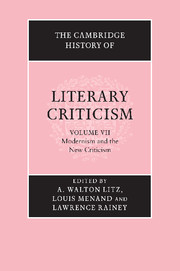5 - Wyndham Lewis
from THE MODERNISTS
Published online by Cambridge University Press: 28 March 2008
Summary
In 1929, in Paleface: The Philosophy of the ‘Melting Pot’, Wyndham Lewis sets out to examine the operations of ‘race-consciousness’ in contemporary fiction and poetry. His subject entails methods and aims far more ambitious than those of ‘literary criticism’, a term he lifts away from his own prose on the tweezers of these inverted commas: ‘these essays do not come under the head of “literary criticism”. They are written purely as investigations into contemporary states of mind, as these are displayed for us by imaginative writers.’ Expanding the centre of attention from literary text to cultural context, Lewis augurs a change in critical ethic and practice that has continued, through the twentieth century, into the flourishing industry of ‘culture studies’. As cultural critic more than cultural student, however, Lewis stands at the root of the contemporary discipline as a most provocative radical, a disturbing witness to the basic tendencies of socially and historically informed readings of literature. For Lewis's emphasis on the cultural grounding of art leads to a thoroughly determinist account, one which he promises, as that last passage continues, as the end and purpose of his inquiry. His essays are ‘intended to set in relief the automatic processes by which the artist or the writer (a novelist or poet) obtains his formularies: to show how the formularies for his progress are issued to him, how he gets them by post, and then applies them’.
- Type
- Chapter
- Information
- The Cambridge History of Literary Criticism , pp. 138 - 150Publisher: Cambridge University PressPrint publication year: 2000



